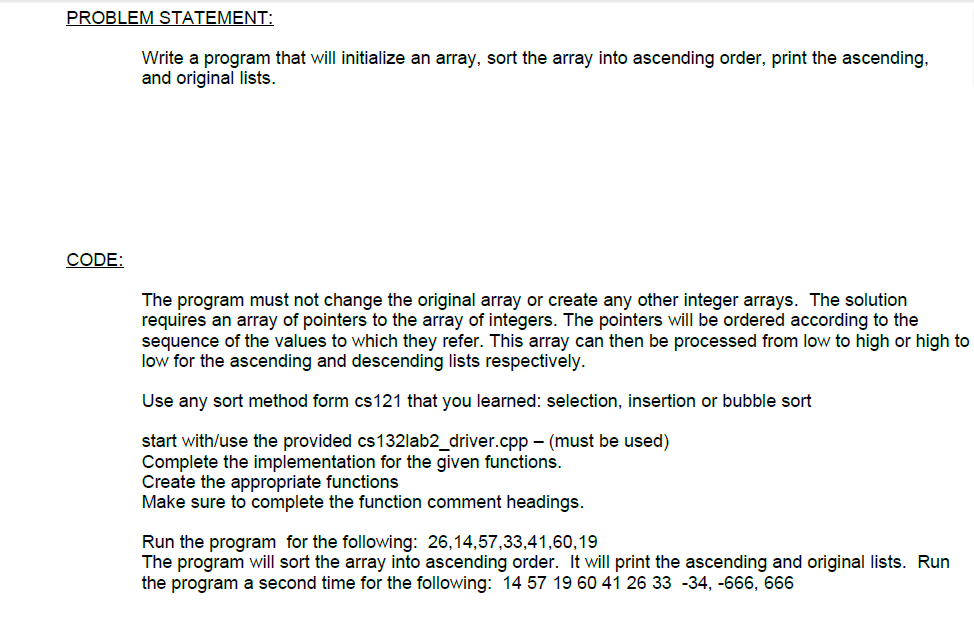Question
I'm struggling really bad please help #include using std::cin; using std::cout; using std::cerr; using std::endl; #include using std::bad_alloc; #include #define int_array 1 #define pointer2int_array 2
I'm struggling really bad please help
#include
#include
#include
#define int_array 1 #define pointer2int_array 2
// Prototype declarations
int getSize();
void* getArray( int &howMuch, int typeOf );
void populateArray( int num_of, int* ptr );
/* prototypes for swap function your sort function a function called printSortedArray which will print the sorted pointer array */
/////////////////////////// -- main -- ///////////////////////////////////////////////////////
int main() {
int SIZE = getSize();
int* dataArray = ( int*) getArray(SIZE, int_array ); int** pointerArray = ( int**)getArray(SIZE, pointer2int_array );
/* TODO add code here, call the appropriate functions */ // using a for loop, print the dataArray here
delete [] dataArray; delete [] pointerArray;
cout
return ( 0 );
}
//////////////////////////////// -- end main -- ////////////////////////////////////////////////
/*************************************************************************************************** * * Function Name: getSize * * Purpose: requests an integer from user * * Input Parameters: none * * Output parameters: none * * Return Value: retuns the user entered integer howMuch * ***************************************************************************************************/
int getSize() { int howMuch; cout > howMuch; return howMuch;
}
/*************************************************************************************************** * * Function Name: getArray * * Purpose: dynamically allocates either an array of ints or an aaray of * int pointers * * Input Parameters: an int howMuch - the size of array to allocate * an int typeOf indicating the type of array to allocate * * Output parameters: none * * Return Value: returns a pointer to an int array or an array of int pointers * ***************************************************************************************************/
void* getArray( int &howMuch, int typeOf ) {
try { switch ( typeOf ) { case int_array: { int* p = new int [ howMuch ]; return( p ); }
case pointer2int_array: { int** p = new int* [ howMuch ]; return( p ); } default: { cerr
} } catch ( bad_alloc &memoryAllocationException ) { cerr
}
/*************************************************************************************************** * * Function Name : * * Purpose : * * Input Parameters : * * Output parameters : * * Return Value : * ***************************************************************************************************/
void populateArray( int num_of, int* ptr ) {
}

Step by Step Solution
There are 3 Steps involved in it
Step: 1

Get Instant Access to Expert-Tailored Solutions
See step-by-step solutions with expert insights and AI powered tools for academic success
Step: 2

Step: 3

Ace Your Homework with AI
Get the answers you need in no time with our AI-driven, step-by-step assistance
Get Started


